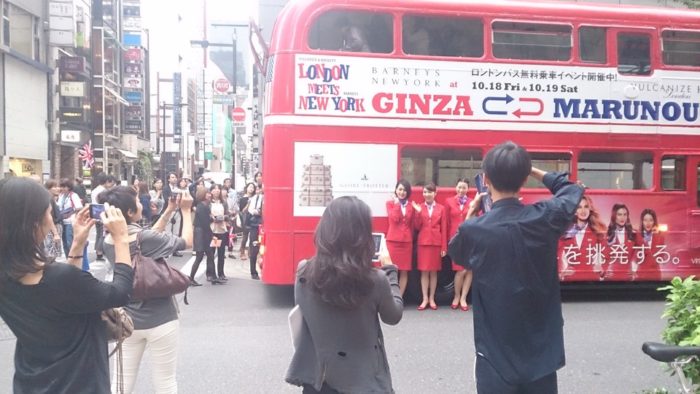Published in the Nikkei Asian Review 1/10/2014
The bearded man behind the check-in counter looked tense. He was dealing with a long line of Japanese tourists returning to Tokyo laden with bags of goodies from Harrods, Burberry and Fortnum & Mason. I was the only person in the queue who recognized him. In those days Richard Branson was best known for his chain of record shops and his airline was a plucky start-up with a tiny fleet.
The year was 1991 and Virgin Atlantic was inaugurating its Heathrow-to-Narita service. Now, twenty three years later, Virgin has announced that it will quit Japan in order to focus on UK-US routes and “other critical global destinations.”
As a long-standing and satisfied customer, I was devastated. Why now, Richard, I wanted to protest. And don’t tell me that defaulting, depopulating Detroit is more “globally critical” than Tokyo, the largest city in the world in terms of economic output.
There are extenuating circumstances. In 2012 Delta Airlines bought a 49% stake in Virgin Atlantic from Singapore Airlines. Detroit is a hub airport for Delta, so adding that route greatly increases the range of the airline’s offerings. Even so, it’s hard to believe that Virgin would axe Japan if the flights were profitable. The sad reality is that sometimes they’re barely half full.
It’s not just a Virgin problem. Currently no airline is running a direct flight between London and the New Kansai Airport in Osaka, Japan’s second city. It’s not just an airline problem either. Citi, HSBC and Standard Chartered are all pulling out of retail banking in Japan.
Does this spate of retreats signify a bleak future for the Japanese economy? By no means. Corporate managements, like everyone else, are strongly influenced by prior experience and often miss the straws in the wind that indicate change ahead.
In 1991 when the first Virgin flight headed from Heathrow to Narita the Japanese stock market had already halved and the economy was slowing dramatically. The writing was on the wall, but few cared to read it. Not shopaholic Japanese tourists, nor Japanese companies who continued to hire and invest to excess, nor even the supposed experts. After Bill Clinton won the presidential election the following November, the first thing he did was to convene a grand conference of Japanologists to discuss the hottest political issue of the day – how to contain the Japanese industrial juggernaut.
What we see today is the mirror-image of that strange conjuncture. The Japanese stock market has just recorded its largest annual rise since the early seventies. There are unmistakeable signs of life in the economy, with the labour market tightening and profit margins at an all-time high. Yet consumers remain cautious, as do company managements, who prefer piling up cash to investing in new facilities. Corporate entertainment budgets have halved since the early 1990s, with dire consequences for high-end nightclubs and ryotei restaurants. The Abe administration is even offering generous tax breaks on entertainment spending in an effort to turn back the tide – a telling contrast with Chinese President Xi Jinping’s crackdown on extravagant wining and dining.
Airlines are pro-cyclical businesses. They make most of their money from the people in the front part of the plane. Corporate travel budgets grow in line with corporate confidence, as executives fly around the world to off-sites, conferences and client meetings. When times are tough they reduce trips to a minimum and/or, especially in the Japanese case, fly coach even for long haul trips. Airline managements run their own companies accordingly. The longer the good times have been rolling, the likelier they are to splash out on new routes and planes.
Banks have a similar modus operandi. They enter new markets only after sufficient financial wealth has been created to attract them. Both industries are lagging indicators, perhaps even contrarian indicators. HSBC, for example, launched its retail banking business in Japan in early 2008, on the cusp of the global financial crisis. As investment guru Marc Faber has pointed out, the hiring and firing policies of financial intermediaries can be useful guides to bull market peaks and bear market troughs.
There are also structural forces which benefit Japan’s economy as a whole, but not European carriers like Virgin. Visitor arrivals in Japan are soaring, but so far the increase comes not from Western business people, but from Asian, predominantly Chinese tourists. The influx of these big-spenders provides a significant boost to the revenues of Ginza department stores. Tourist arrivals in Japan have risen from 5 million in 2004 to a likely 12 million this year. The government targets 20 million by 2020, the year Tokyo hosts the Olympics. With the yen at its cheapest in real terms since 1972, it won’t be long before Westerners flock back to explore business opportunities and enjoy Tokyo’s unbeatable restaurants and night-life.
So you see, Richard, there’s plenty going on. It’s not too late to change your mind. But if you don’t, here’s one loyal customer who wants to be aboard that last era-ending flight out of Tokyo next February.
